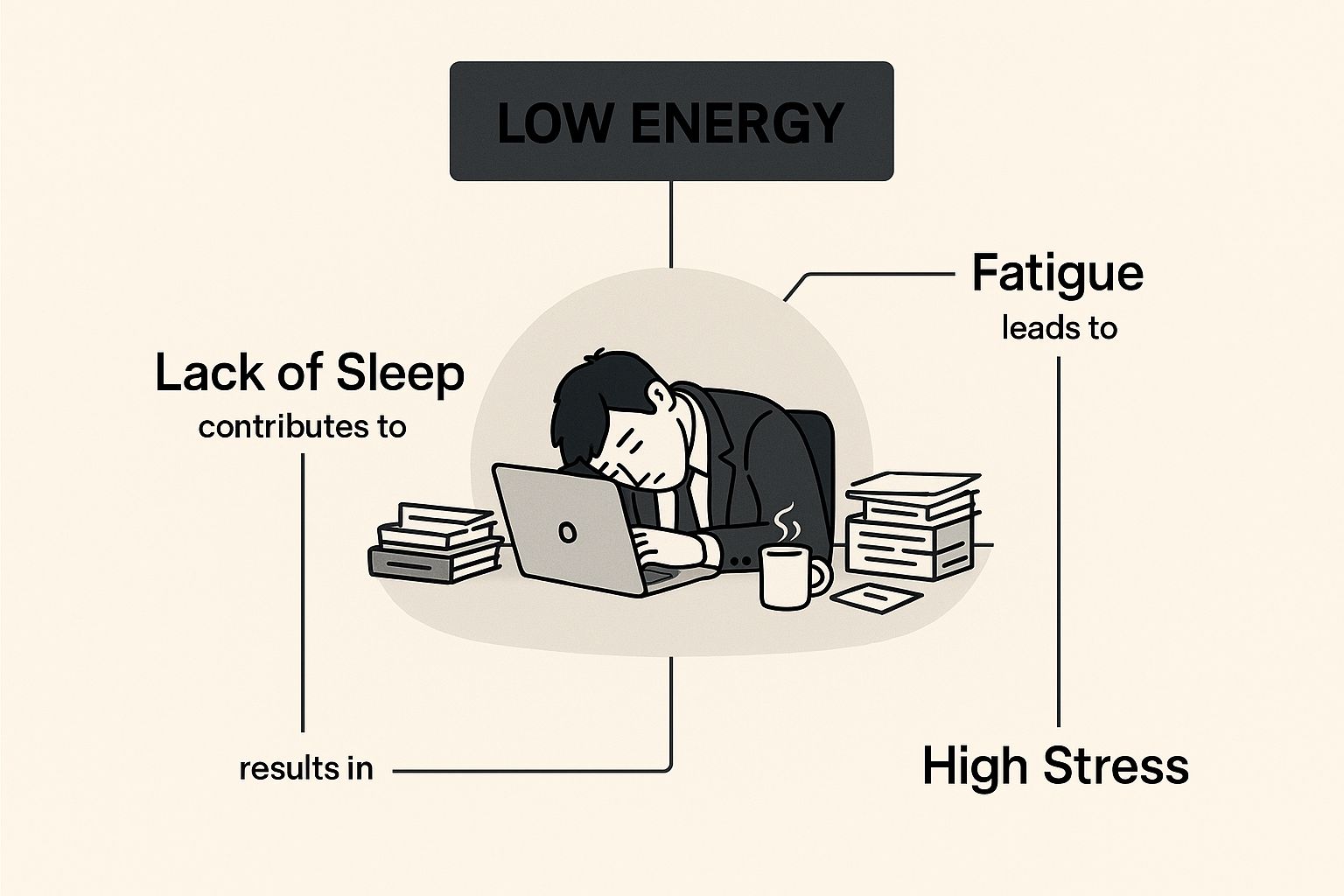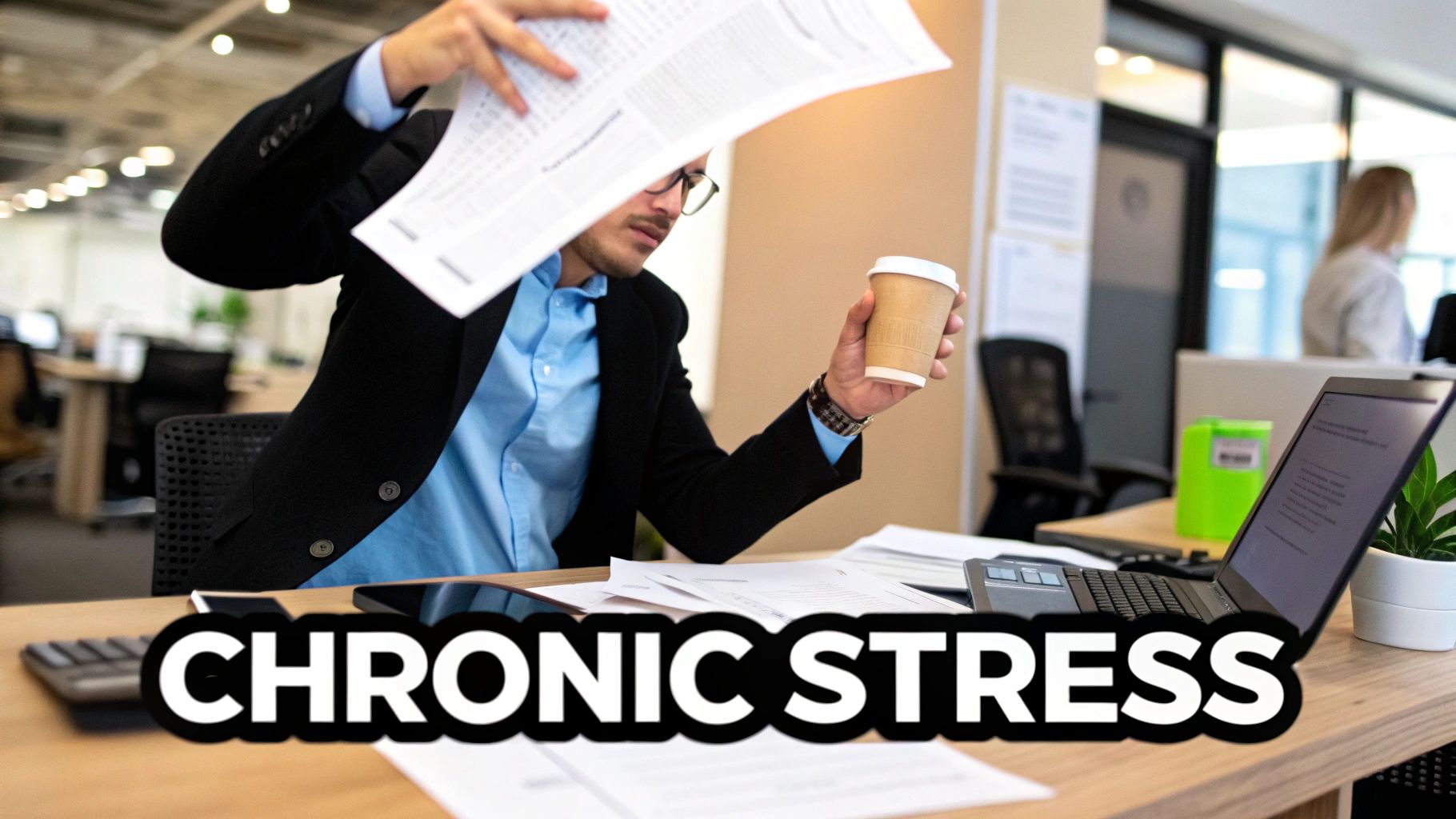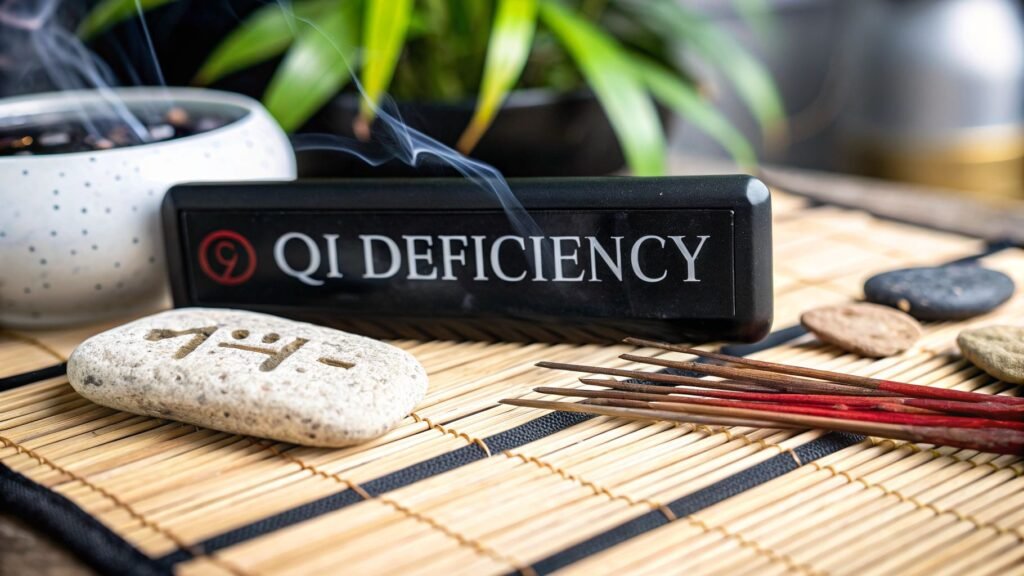In Traditional Chinese Medicine (TCM), Qi deficiency is a state where your body lacks enough vital energy, or Qi, to function optimally. Think of it as your internal battery constantly running on empty, leaving you feeling drained no matter how much you rest.
What Is Qi Deficiency Explained Simply
Have you ever felt a deep, persistent exhaustion that sleep just can’t seem to fix? It’s a frustrating experience where simple tasks feel monumental and your motivation just isn't there. This isn't just ordinary tiredness; from a TCM perspective, it could be a sign of Qi deficiency, a depletion of your body’s essential life force.
Imagine your body is a smartphone. Qi is the battery power that runs all its applications—from digesting your food and fighting off a cold to thinking clearly and moving your limbs. When your phone is fully charged, it operates smoothly and efficiently. But when the battery is low, apps start crashing, the screen dims, and performance slows to a crawl.
Qi deficiency is a lot like your body’s battery being stuck at 15%. Your internal "operating system" begins to lag, leading to a cluster of symptoms that go far beyond simple fatigue. This is why you might experience a handful of seemingly unrelated issues all at once when your Qi is running low.
The Feeling of a Depleted Battery
This lack of energy is more than just a physical sensation; it can impact your entire being. Many people describe it as trying to move through the day with an invisible weight holding them back. This is where the wisdom of TCM really shines—it recognizes that your feelings of exhaustion are valid signs of an underlying imbalance.
The good news is that this is a well-understood and addressable pattern.
In TCM, Qi is the very essence of life, governing all physiological and psychological processes. A deficiency means the fundamental power source for your health is weakened, affecting everything from your immune response to your emotional stability.
Learning to spot the signs of a depleted internal battery is the first step toward recharging it. Let’s look at what that feels like in day-to-day life.
To help you get a clearer picture, I've put together a quick summary of the most common signs. Think of this table as a quick checklist to see if your own experiences line up with the classic pattern of a depleted Qi battery.
Quick Signs of a Depleted Qi Battery
| Symptom Category | Common Manifestations |
|---|---|
| Physical Energy | Persistent fatigue, shortness of breath, a weak voice, and spontaneous sweating with minimal exertion. |
| Mental Clarity | Brain fog, difficulty concentrating, apathy, and a general lack of mental drive or focus. |
| Digestive Health | Poor appetite, bloating after meals, loose stools, and a craving for sugary or processed foods. |
If these symptoms resonate with you, you're in the right place. Understanding the root cause is the key to finally getting your energy back on track.
Understanding Qi: Your Body's Vital Energy Source
Before we can really get a handle on what it means to be Qi deficient, we need to talk about what Qi actually is. In Traditional Chinese Medicine (TCM), it’s often translated as "vital energy" or "life force," but that doesn't quite capture its dynamic nature. It's the invisible, animating power that runs everything in your body, from your heartbeat to your thoughts.
Think of Qi as the electricity powering a complex machine—your body. When the power is strong and steady, every function runs smoothly. Your digestion works efficiently, your immune system is robust, your limbs are warm, and your mind is clear. Qi is the fundamental force behind every single process of movement and transformation within you.
But what happens when the power flickers or the battery runs low? The whole system starts to lag. That's the essence of Qi deficiency: a state where your body’s core energy is depleted, causing a system-wide slowdown.
The Essential Functions of Qi
In TCM, Qi isn't just one thing; it has several critical jobs to do. Understanding its roles makes it much clearer why a deficiency can show up in so many different ways.
- Transforming and Transporting: Qi is the workhorse that turns the food you eat and the air you breathe into usable energy and then delivers it to every cell in your body.
- Warming the Body: It acts like your internal furnace, keeping your body at a stable, healthy temperature. This is a big reason why people with low Qi often feel cold, especially their hands and feet.
- Protecting and Defending: A specific aspect of Qi, known as Wei Qi, is your first line of defense. It acts like an energetic shield, protecting you from external pathogens. When your Wei Qi is weak, you're more likely to catch every cold that goes around.
- Holding and Containing: Qi also provides the structural integrity to keep things in place. It holds your organs up and ensures fluids like blood and sweat stay where they belong.
The demands of modern life can feel like a constant drain on this vital energy, which is a big part of why so many of us feel run down.

This image of a slumped-over professional really captures it. The constant pressure of overwork and stress can drain our Qi reserves, leaving very little energy for the body's essential housekeeping. When you're consistently making more withdrawals than deposits to your energy bank account, the symptoms of deficiency start to become chronic.
To get a more complete picture of this foundational concept, you can dive deeper into what is Qi in Chinese medicine and its crucial role in your overall health.
Common Causes of a Drained Qi Battery

To figure out how to recharge your internal battery, you first have to understand what’s draining it. Qi deficiency isn’t something that happens overnight. It’s more like a slow leak, developing from a mix of lifestyle habits, emotional strain, and physical factors that gradually deplete your energy reserves. Think of it as making constant small withdrawals from your body’s energy bank without making enough deposits.
One of the biggest culprits in our modern world is simply chronic overwork and stress. When you consistently push past your limits—with long hours at the office, mental burnout, or constant emotional demands—you force your body to burn through its Qi faster than it can be restored. Living in that perpetual "fight or flight" mode is a primary reason so many of us feel perpetually exhausted.
The Role of Diet and Digestion
In TCM, your digestive system is the main "factory" that converts the food you eat and the air you breathe into usable Qi. When your dietary habits are off, you're essentially weakening this factory, and it can’t produce the energy you need to thrive.
A few common dietary patterns can really throw a wrench in the works:
- Excessive Cold or Raw Foods: Think lots of salads, iced smoothies, or cold drinks. Your digestive system has to work overtime just to warm this food up to body temperature before it can even begin digestion. Over time, this extra work depletes its energy.
- Irregular Eating: Skipping meals or eating at odd hours messes with your body's natural rhythm. This makes it much harder for your system to efficiently produce Qi and Blood.
- Processed Foods: A diet heavy in nutrient-poor foods doesn't give your body the high-quality building blocks it needs to create strong Qi. It’s like trying to build a solid house with flimsy materials.
At its core, a weak digestive system just can't pull enough energy from your food. This inefficiency is a direct path to developing Qi deficiency.
Qi deficiency is more than just feeling tired for a day or two; it's a recognized pattern of imbalance in TCM. It's especially common as we get older. One study found that 17.2% of participants had a Qi-deficient constitution, with the rate increasing with age. In fact, the prevalence was 15.1% in those aged 60 to 69, which shows how the natural aging process itself can contribute to this energy decline. You can explore further details on body constitution research here.
Other major factors can drain your Qi, too. A long-term chronic illness puts a heavy tax on the body's resources, slowly chipping away at your energy. Big life events like childbirth also require a massive output of both Qi and Blood.
Finally, the simple act of aging leads to a natural decline in our foundational Qi, which is why older adults are often more susceptible. By pinpointing these root causes in your own life, you can start making targeted changes to protect and, more importantly, rebuild your vital energy.
Recognizing the Symptoms of Qi Deficiency
Pinpointing Qi deficiency isn't just about feeling tired. It's about recognizing a very specific pattern of signs that show up physically, mentally, and even in your appearance. Think of Qi as the fundamental energy that keeps everything in your body running. When you're running low, it creates a ripple effect of symptoms that might not seem connected at first.
The most common sign, and the one most people notice first, is a persistent fatigue that just won't go away, no matter how much you sleep. This isn't your typical end-of-a-long-week tiredness. It's a deep, bone-weary exhaustion that makes even small tasks feel like climbing a mountain. It’s the feeling of starting every single day with your battery already in the red.
This profound lack of energy shows up in your physical stamina, too. You might find yourself short of breath after walking up a single flight of stairs or notice that your voice sounds weak and quiet. In TCM, these are classic clues that your Lung Qi, which governs breathing and the strength of your voice, is running on empty.
Physical and Observable Clues
Beyond just how you feel, Qi deficiency often leaves visible signs. For a practitioner, these subtle clues are like reading a map of your body’s internal energy landscape.
One of the most revealing indicators is the tongue. Someone with Qi deficiency will often have a pale, swollen, or "boggy" tongue. You might even see teeth marks, or scallops, along the sides. This tells us that the body lacks the energetic force to properly circulate fluids and maintain muscle tone.
Here are a few other physical markers we look for:
- A Pale Complexion: When there isn't enough Qi to move Blood and nourish the skin, your face can look dull, washed out, or sallow.
- Spontaneous Sweating: This is sweating that happens with little to no exertion. It’s a sign that your Defensive Qi (Wei Qi) is too weak to properly regulate your pores.
- A Weak Pulse: In a pulse diagnosis, a deficient pulse feels faint, deep, and lacks force. It’s a direct confirmation of the body's overall lack of vitality.
Mental and Emotional Manifestations
The impact of low Qi isn't just physical—it deeply affects your mental and emotional state. When Qi is depleted, the mind (or Shen) doesn't have the energy it needs for sharp thinking and emotional stability. This can show up as a persistent brain fog, trouble concentrating, or just a general feeling of apathy and low motivation.
The connection between our energy levels and our mood is incredibly strong. Modern research is even starting to confirm this ancient understanding. For instance, one study found a direct positive correlation between the severity of Qi deficiency and depressive symptoms, underscoring the powerful mind-body connection that is central to TCM. You can read the full study on TCM patterns and mental health.
It's easy to mistake these signs for other issues, but in TCM, we see it as a foundational energy problem. For example, both Qi deficiency and Qi stagnation can cause mood changes. The key difference is that deficiency is about depletion—an empty tank—while stagnation is about blockage, or a traffic jam. To see the contrast, check out our guide on Liver Qi stagnation symptoms.
The Long-Term Health Impact of Low Qi

It's tempting to brush off the subtle signs of Qi deficiency, but that's a bit like ignoring the check engine light on your car. You might make it to your destination today, but you're risking serious damage down the road. That persistent fatigue is more than just a nuisance; it’s a warning that your body's foundational energy is running low, potentially setting the stage for more complex health issues.
Think of Qi as the very force that powers every single system in your body. When that force is chronically weak, your body's natural defenses start to crumble. This is why people with low Qi often find themselves catching every cold that goes around. Their protective Wei Qi—which you can think of as the TCM equivalent of the immune system—simply doesn't have the strength to fend off pathogens.
How It Snowballs into Deeper Health Issues
A prolonged state of Qi deficiency isn’t static; it creates a cascade effect that ripples through your organ systems, leading to deeper imbalances. This is especially true for digestion and blood, two areas that are intimately connected in the world of Chinese medicine.
- Weakened Digestion: With deficient Spleen Qi, your body struggles to extract and transform the nutrients from your food. This can manifest as chronic bloating, loose stools, or a poor appetite, which in turn makes it even harder to generate new Qi.
- Blood Deficiency: In TCM, Qi is often called the "commander of the Blood." Without enough Qi to produce and move Blood, a condition of Blood deficiency can arise, bringing symptoms like dizziness, a pale complexion, and even memory issues.
- Chronic Fatigue: Left unaddressed for years, Qi deficiency can become a major contributor to conditions that look a lot like chronic fatigue syndrome, where the body's entire energy-production system is deeply compromised.
Untreated Qi deficiency sets the stage for a gradual decline in overall health and resilience. It’s not just about feeling tired; it’s about the slow erosion of your body’s ability to repair, defend, and sustain itself, which is crucial for healthy aging.
This connection becomes particularly critical as we get older. Modern research has started to confirm this ancient wisdom, showing that Qi deficiency is independently correlated with frailty. This is a complex syndrome that affects multiple organ systems and can significantly worsen outcomes for chronic conditions like cardiovascular disease and cancer.
Ultimately, older adults with low Qi are far more vulnerable to serious health setbacks. You can discover more insights on the link between Qi and frailty to better understand its clinical importance.
Actionable Strategies to Restore Your Qi
Knowing you have Qi deficiency is one thing, but actively rebuilding it is the real journey back to feeling like yourself. Restoring your body's vital energy is a lot like making steady deposits into a depleted bank account. It requires a thoughtful approach that combines diet, targeted herbs, and specific mind-body practices to recharge your internal battery from the ground up.
The first and most crucial step in rebuilding Qi starts on your plate. In Traditional Chinese Medicine, the digestive system is seen as the primary "factory" for creating energy from the food we eat. To support this vital process, you need to focus on warm, cooked, and nourishing meals that are easy for your body to break down and absorb.
Think of it this way: when you eat cold, raw foods, you're forcing your digestive system to work overtime. It has to expend precious Qi just to warm the meal before digestion can even begin. It’s like asking an already exhausted employee to run a marathon before starting their actual workday.
Nourishing Your Body with Qi-Building Foods
To get your internal energy factory running smoothly again, try weaving these dietary principles into your daily routine:
- Prioritize Warm, Cooked Meals: Soups, stews, steamed vegetables, and congees are your best friends here. These foods are essentially pre-digested, which makes them much easier for a weakened system to process.
- Embrace Root Vegetables: Sweet potatoes, carrots, and squash are naturally sweet and grounding. They are known to tonify the Spleen Qi, which is central to your digestive energy.
- Use Warming Spices: A little ginger or cinnamon does more than just add flavor. These spices gently warm the digestive system, boosting its efficiency.
Making these simple shifts in your diet provides your body with high-quality, easily accessible fuel. This is a foundational and powerful way to address Qi deficiency at its core.
The Role of Herbs and Mind-Body Practices
Beyond what you eat, certain herbs are famous for their ability to build Qi. Astragalus (Huang Qi) is a classic, often used to strengthen the body's defensive Qi and boost overall vitality. Ginseng (Ren Shen) is another powerful tonic, well-known for its ability to fight fatigue and restore strength.
Remember, these herbs are potent medicine. They should always be used under the guidance of a qualified TCM practitioner who can create a formula that's right for your unique constitution and specific needs.
Finally, gentle movement and targeted therapies can make a huge difference in your recovery. Practices like Tai Chi and Qigong are incredible because they are specifically designed to cultivate and circulate Qi without causing further depletion—a common pitfall of more intense exercise when you're already drained.
Acupuncture is another cornerstone therapy for directly influencing the body's energy pathways. By stimulating specific points, a practitioner can help unblock stagnation and kickstart the body’s natural healing and energy-building processes. For those dealing with severe depletion, exploring effective natural remedies for chronic fatigue can open up additional avenues for recovery.
Moxibustion, a warming therapy often paired with acupuncture, is especially effective for infusing a deep sense of warmth and energy back into the system. These treatments work in tandem to restore that deep-seated energy that has been lost over time. You can learn more about how acupuncture for chronic fatigue specifically addresses this kind of exhaustion and its underlying causes.
Frequently Asked Questions About Qi Deficiency
It's natural to have questions as you start to connect the dots between how you're feeling and the principles of Traditional Chinese Medicine. When exploring something like Qi deficiency, a few key questions almost always come up. Let's walk through them to give you a clearer picture.
How Is Qi Deficiency Different From Just Feeling Tired?
That’s a great question, and the distinction is crucial. Everyone feels tired now and then; it’s a normal response to overexertion or a few nights of poor sleep. A good rest usually fixes it.
Qi deficiency, however, is a much deeper and more persistent state of exhaustion. Think of it as running on an empty tank day after day, where even a full night's sleep doesn't seem to make a dent. This isn't just fatigue; it's a profound lack of foundational energy that brings along a whole host of other signs—like shortness of breath, a weak pulse, a pale tongue, or digestive issues. It's a systemic issue, not just a temporary slump.
Can I Diagnose and Treat Qi Deficiency Myself?
While you can absolutely become skilled at recognizing the signs in your own body, a proper diagnosis really needs the trained eye of a TCM practitioner. It's easy to misinterpret the symptoms because many of them overlap with other imbalances.
A professional will use very specific diagnostic tools, like feeling the subtle qualities of your pulse and observing the color and coating of your tongue, to get a precise picture of what's happening internally. Trying to self-prescribe herbs can be risky; the wrong formula might not only be ineffective but could actually push your body further out of balance.
A trained practitioner can spot the difference between Qi deficiency and similar-sounding patterns like Qi stagnation or Blood deficiency. This ensures the treatment you receive is tailored perfectly to what your body truly needs.
How Long Does It Take to Recover From Qi Deficiency?
There’s no one-size-fits-all answer here, as recovery really depends on you. Factors like how long you've been feeling this way, the severity of the deficiency, and your overall health all come into play. Your commitment to the treatment plan is also a huge piece of the puzzle.
For a milder case, you might start feeling a noticeable shift within a few weeks, especially with changes to your diet and rest. But for more deep-seated, chronic conditions, it can take several months of consistent treatment to truly rebuild your body's energy reserves. This often involves a dedicated combination of acupuncture, herbal medicine, and meaningful lifestyle adjustments.
At Eric Tsai Acupuncture & Herbs, we specialize in getting to the root cause of your fatigue and crafting a plan to bring back your vitality. If you're tired of feeling drained and ready to rebuild your energy from the inside out, we're here to help. Schedule a consultation with us today to get started. Learn more and book your appointment at https://drerictsai.com.

